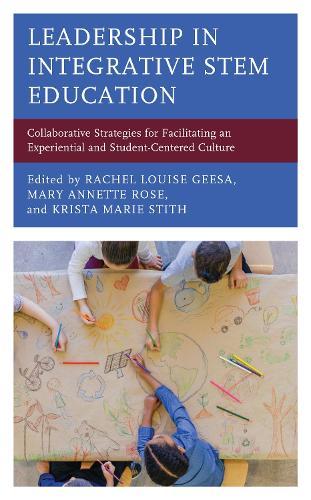Overview
In the face of complex local and global problems, there is a critical need to prepare PK-12 students to be innovative, resilient problem-solvers and well-equipped STEM-literate citizens. With focus upon integrated content, college and career readiness, authentic problems, and action-oriented pedagogies, integrative STEM education provides a promising approach to address this challenge. Integrative STEM programming with its fusion of science, mathematics, engineering, and technology content and practices may manifest in a variety of ways: Teachers co-plan an engineering design experience within a social studies class. A community business partner offers a job-shadowing experience. Students engage in an after-school program at a makerspace. Educators collaboratively re-envision and interweave STEM across the curriculum. And more... Current and future educational leaders striving to improve STEM programming will find this book to be a useful resource. Its introduction offers an orientation to the fundamental goals, principles, and practices of integrative STEM education. While later chapters delve into the facets of STEM programming and the competencies of STEM leadership which form the foundation of a coherent program. These evidence-based strategies, examples, and resources may provide inspiration to leaders as they initiate and enhance an equitable integrative STEM culture within their school.
Full Product Details
Author: Rachel Louise Geesa , Mary Annette Rose , Krista Marie Stith
Publisher: Bloomsbury Publishing Plc
Imprint: Rowman & Littlefield Publishers
Dimensions:
Width: 15.40cm
, Height: 1.90cm
, Length: 21.90cm
Weight: 0.494kg
ISBN: 9781475857368
ISBN 10: 1475857365
Pages: 268
Publication Date: 30 November 2021
Audience:
Professional and scholarly
,
Professional & Vocational
Format: Paperback
Publisher's Status: Active
Availability: In Print 
This item will be ordered in for you from one of our suppliers. Upon receipt, we will promptly dispatch it out to you. For in store availability, please contact us.
Table of Contents
Dedication Foreword-Fenwick W. English Preface-Rachel Louise Geesa, Mary Annette Rose, and Krista Marie Stith Acknowledgements Chapter 1: Introduction: Educational Leadership and Integrative STEM Education Krista Marie Stith, Rachel Louise Geesa, and Jim Egenrieder Chapter 2: Leadership to Foster an Integrative STEM Mission and Culture Rachel Louise Geesa Chapter 3: Equity, Diversity, and Inclusion within Integrative STEM Education Rachel Louise Geesa, Mary Annette Rose, Krista Marie Stith, Kendra Lowery, and Joanne Caniglia Chapter 4: Considerations for Integrative STEM Infrastructure and Programming Michael E. Grubbs and Krista Marie Stith Chapter 5: Facilitating an Integrative STEM Curriculum Mary Annette Rose and Krista Stith Chapter 6: Collaboration in PK-12 Integrative STEM Instruction Suparna Sinha, David J. Shernoff, and Cheryl Cuddihy Chapter 7: Extended Learning Opportunities in Integrative STEM Kate Shively Chapter 8: Promoting Professional Learning for Integrative STEM Ginger Mink Teague, Krista Marie Stith, and Rachel Louise Geesa Chapter 9: Assessment and Data-Informed Decisions in Integrative STEM Mary Annette Rose, Krista Marie Stith, Rachel Louise Geesa, and Jim Egenrieder Chapter 10: Evaluation of Integrative STEM Education Rachel Louise Geesa, Mary Annette Rose, Krista Marie Stith, and Marilynn Marks Quick Conclusion: Leading the Future Generation to Success Through Integrative STEM Education Krista Marie Stith, Rachel Louise Geesa, and Mary Annette Rose About the Contributors
Reviews
Integrative STEM education is critical for our students and our economy. We must ensure our students develop transportable, in-demand skills enabling them to thrive in schools and in their careers. Drs. Geesa, Rose, and Stith have made a compelling case and done an extraordinary job in laying out our charge and responsibilities as innovative educational leaders. -- Vince M. Bertram, EdD, MBA, President and Chief Executive Officer, PLTW
Author Information
Rachel Louise Geesa, EdD, is an assistant professor in the department of educational leadership at Ball State University. With formal training and professional experience in art education, gifted education, and educational leadership, she guides pre-service and in-service educational leaders to provide inclusive and integrative learning experiences to PK-12 learners. Mary Annette Rose, EdD, is an associate professor of educational studies at Ball State University. She is a practitioner of integrative teaching and learning approaches, especially those that focus upon the application of science, mathematics, and social studies to enhance energy, environmental, and technological literacy. Krista Marie Stith, PhD, is the director of the center for gifted studies and talent development at Ball State University. She holds a degree in curriculum and instruction from the integrative STEM education department of Virginia Tech and provides support to pre-service and in-service educators on integrative pedagogy.
Tab Content 6
Author Website:
Countries Available
All regions
|



